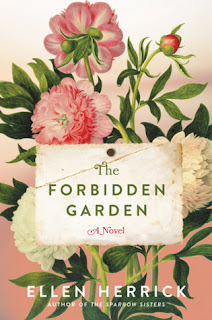My wish was granted. I'll start out by saying you should read The Sparrow Sisters first before you read The Forbidden Garden. Having Sorrel's background, and understanding where she comes from and the talents of the Sparrow sisters will give this novel more clarity. Granted, you could read this without reading the first novel, but then I imagine you'd spend a lot of time wondering about Nettie and Patience, and just what the heck happened in The Sparrow Sisters. Save yourself some frustration!
So. Sorrel Sparrow is asked to travel to England by Sir Graham Kirkwood to re-create a Shakespeare garden on his family's estate, Kirkwood Hall. This garden has been lying dormant for hundreds of years, thanks to a curse placed on it by Graham's ancestor (and complete nasty creep!) Thomas Kirkwood. Sure enough, anyone who attempted to bring the garden back to life mysteriously became ill and died. Sir Graham's wife had been determined to succeed, and became very ill. Sir Graham has decided once and for all to break the curse, and Sorrel, known for her mysterious gifted ways with plants and gardens, was recommended to him.
Sorrel is unaware of the curse when she arrives, but is soon given the story of the garden, as she is quickly drawn into the Kirkwood family. They really are a wonderful group of people; warm, friendly, down to earth, and people who love and protect their legacy. One part of their legacy are the legendary family tapestries, kept locked up in a room where they are left in quiet. Why? Because these tapestries tell a disturbing story of a chase, but the seventh tapestry is missing, and without that tapestry, the story remains inconclusive. The tapestries are so disturbing that no one is allowed to view them. But, as you find out, they are a big part of the reason why the Shakespeare garden is cursed.
Will Sorrel's magic way with nature overcome the dark history of the garden? Can she break the curse? I have to say I was sucked into this story pretty quickly. The Kirkwood family is so well drawn out that I was ready to sit down in their cozy kitchen and visit with them. Sorrel's magical ability--which she doesn't see as magic at all, just the way she is--causes people to both admire, be astonished, and be doubtful of it all. What is magic, and what is Godly? Can something be both? Sorrel's budding romance with Andrew, who is going through his own crisis of faith, leads you into some interesting thoughts on faith, having a calling, and how those can be based in reality.
Gardens, luscious flowers, delicious foods, a cast of characters that are pretty fantastic, and an interesting family history--complete with a villain. It's a combo that I couldn't resist!
Rating: 4/6 for a lovely sequel to The Sparrow Sisters. I hope there is more to come, as I love the world Ellen Herrick has built and want more! For fans of Alice Hoffman, Sarah Addison Allen, M.J. Rose, and Brunonia Barry.
Available in paperback, e-book, audio, and hardcover.









